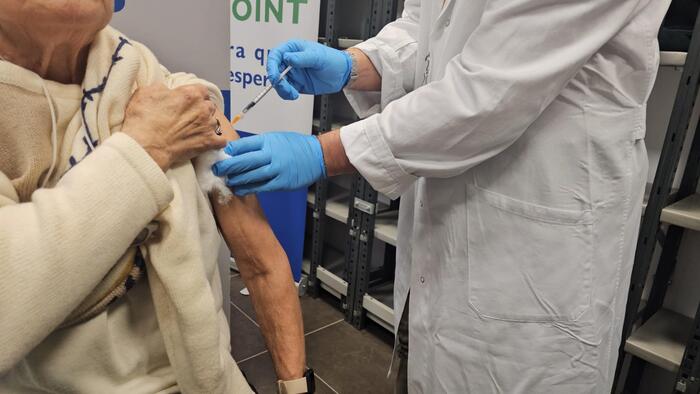People who live in residences for the elderly or disabled and their carers (health and social health personnel) will be the first to receive vaccines against covid-19.
This was announced yesterday by the Minister of Health, Salvador Illa, after the Council of Ministers, where he presented the plan to immunize the Spanish population.
The forecast is for it to begin in January by priority population groups: after residents, the second group will be first-line health personnel;
the third, the rest of health and social health personnel.
In fourth place will be placed the large dependents who do not live in residences, people with disabilities who require intense support measures.
A total of 2.5 million people will receive immunization between January and March, if the deadlines set by the Government are met.
For the rest, 95% of the population, Illa did not want to reveal dates.
The huge differences between Pfizer, Moderna and Oxford vaccines
The ministry has worked for two months on this plan, in which 18 population groups have been established based on four risk criteria: severe morbidity and mortality, exposure to the disease, socioeconomic impact, and disease transmission.
"The most vulnerable will always go first," said Illa.
"An ethical framework has been established where the principles of equality, dignity of rights, necessity, equity, protection of the disability and the minor, social benefit and reciprocity prevail," added the minister, who did not want to say which are the other 14 groups prioritization.
"We will release them in due course," he said.
Health, through the European Union, has signed or finalized contracts with six pharmaceutical companies (AstraZeneca, Sanofi-GSK, Janssen, BioNTech-Pfizer, CureVac and Moderna).
Spain has 140 million doses, which are equivalent to 80 million immunizations (most require double doses), almost double that of citizens.
This margin is thought to have enough doses in case the experiments fail or are delayed and to boost production and that developing countries can benefit.
The first stage (between January and March) depends on the final approval of the vaccines, since none have yet received the green light from the health authorities, although there are three very advanced that are already in the review phase.
The second stage would run until June.
In it, progress would continue in the vaccination of risk groups, predictably older and people with pathologies, although the Government keeps it a secret.
The rest of the population would receive the vaccine later, when the most vulnerable people are already immunized.
Although Health ensures that it has a vaccination plan, it has not made public more details about it or explained why it considers that it is not the time to communicate it.
To questions from this newspaper, the Ministries of Health that have responded have assured that they do not have the details of the plan, beyond what was presented in the Council of Ministers.
The Xunta de Galicia, for example, admits that it participated in the working groups that have prepared it, but criticizes the central government for approving it without providing the autonomies with "any information" on its content.
"When someone does not want to tell what to do it is because, probably, they still do not know clearly what to do," said the Galician president, Alberto Núñez Feijóo.
The only European country that has submitted a vaccination plan to date is Germany.
Unlike Spain, where it will be administered in health centers, in the German country they will put special infrastructures so that the process does not interfere with the usual health provision.
The prioritization is also different.
As explained by the German health minister, the first will be people at risk (over 60 years or with chronic pathologies), followed by health workers and dependents.
In the UK the plan has yet to be made public, but details of the initial draft were leaked on 13 November.
Most doses would be delivered between early January and mid-March, at an average rate of 4-5 million per week.
On the one hand, experts assure that transparency is essential when communicating a vaccination plan, when surveys reveal that between 30% and 40% of the population is reluctant to receive the drugs.
On the other, as Pedro Gullón, from the Spanish Epidemiology Society points out, measures with minimal fringes should be communicated so that there are no constant rectifications.
In this sense, Andrea Burón, from the Spanish Society of Public Health, thinks that it makes sense not to reveal details that may change.
“It is in the countries with the highest incidence of cases where there is the worst perception of management and the least intention to get the vaccine.
This may be related to the management of the information that has been done ”, says Antonio Sanz, professor of Psychology at the Autonomous University of Barcelona.
The psychologist warns that "trust in scientists and politicians is undermined" and warns that paying speeches with announcements or deadlines that are not met later damages the credibility of the authorities: "People are quite burned because expectations are built that later they are not fulfilled and credibility is lost here ”.
With information from
Jessica Mouzo
,
Sonia Vizoso
,
Isabel Valdés
and
Rafa de Miguel
.
Information about the coronavirus
- Here you can follow the last hour on the evolution of the pandemic
- This is how the coronavirus curve evolves in the world
- Download the tracking application for Spain
- Guide to action against the disease


/cloudfront-eu-central-1.images.arcpublishing.com/prisa/LXJQLIHEEJDHBNVN45ZLQLAMJY.jpg)






/cloudfront-eu-central-1.images.arcpublishing.com/prisa/T4T5B27RLNDT3K5CEDTOP5QLL4.jpg)